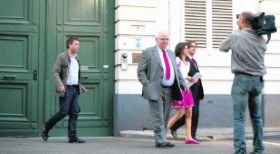|
All or nothing for De Troy By Yves Delepeleire [Translated from the original in De Standaard.] Brussels -- Everyone thought that Operation Chalice was dead and buried. Until yesterday, when the court conducted new searches. For the investigating judge De Troy, this is D-Day.
Yesterday it seemed that the whole circus would start again from scratch, as a year and a half ago: searches for the Archdiocese of Malines-Brussels, and in front of the cameras. But unlike the show of force in June 2010, the examining magistrate in Brussels, Wim De Troy, who had allowed 140 linear meters of cardboard boxes to be thrown out a of window and into vans, showed restraint yesterday. The detectives were only looking for ten files. In the dioceses of Antwerp and Hasselt, some files were also seized. That the court would conduct searches at the Church for the second time in eighteen months came as a surprise to the outside world. The entire investigation known as Operation Chalice -- about abuse in the Church and the possible guilty omission (i.e., negligence) of ecclesiastical authorities -- was it not dead and buried after all? Yes and no. After the spectacular raids of 2010 -- in the archdiocese, at Cardinal Danneels' home, in the St. Rombouts Cathedral, and the Adriaenssens commission -- the judicial inquiry was transformed into a pitched battle. The Brussels grand jury (AI) had to speak several times on the validity of the searches, until no one could make sense of them. AI finally decided late last year that De Troy had no right to search for secret files in all those places. Thus he could no longer use in his investigation all the information he had obtained in the searches. That was a heavy blow to Operation Chalice, which threatened to fizzle out. But De Troy but did not come up empty handed. For example, after Operation Chalice, hundreds of victims came forward with their story to the federal prosecutor's contact person. Eighty-seven people filed a civil complaint. Moreover, De Troy can still use the files that he had received from magistrate Godelieve Halsberghe, the predecessor of the Adriaenssens commission, and from whistleblower priest Rik Devillé. Information from those records was the basis for the court's searches and seizures today. Moreover, the investigation will focus solely on gross negligence (or negligence by omission). By examining a few dozen cases of priests -- often deceased -- the court hopes to find, in correspondence or other documents, evidence that shows that other clergy members protected those priests. The legal actions today are therefore not so surprising as they first appear. They are even a logical outgrowth of the hundreds of stories that the investigators have examined more closely in recent months, and for which they now have concrete evidence of negligence in order to take action. Resignation The key question remains, whether these searches will lead to results. According to the court, the investigation is now "in the home stretch", but it is very likely that at the end of it, no one will be charged, because the statute of limitations for guilty negligence is expired . But the investigation is ongoing and must be finished. Because of the display of power in the beginning, De Troy has no other option. Or, as the lawyer of the bishops says, if he doesn’t want to lose face totally, he will have to come up with something. But De Troy does not have much time left. At the beginning of April he will normally resign from his position as examining judge in Brussels. He submitted his resignation in September, but the then Minister of Justice, Stefaan De Clerck (CD & V), asked him to continue for six months, to ensure continuity of service. That would be the end of March. De Troy is supposed to leave then. The reason De Troy tendered his resignation was a conflict with his superior Luc Hennart, the president of the Brussels court of first instance. Hennart had decided to transfer De Troy's Registrar, Peggy Coppens. She and De Troy had formed an inseparable team for five years. According to De Troy, she is essential in Operation Chalice, because she is the best informed. But according to Hennart, she was too much under the influence of her boss, De Troy.
|
.
Any original material on these pages is copyright © BishopAccountability.org 2004. Reproduce freely with attribution.
